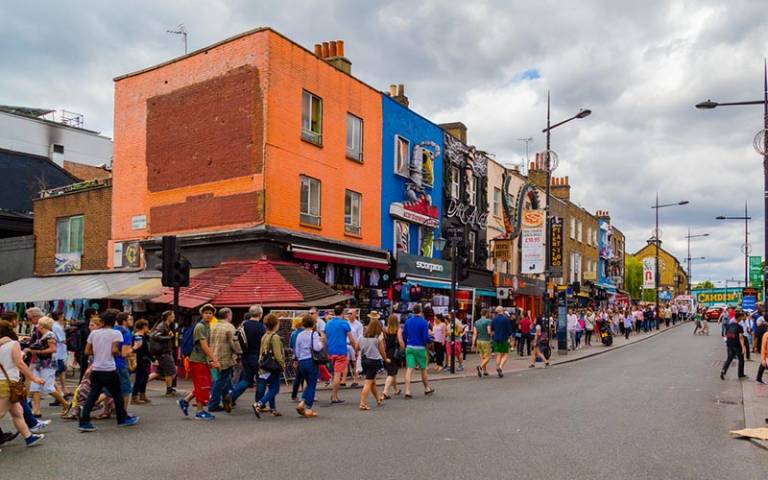UCL and Camden work together to re-imagine high streets
Researchers from UCL have provided vital data analysis as part of London Borough of Camden’s Future High Streets programme.

5 October 2022
The aim of the programme is to ‘re-imagine’ high streets for the 21st century and ensure they are the heart of community and economy.
Unique challenges on the high street
Even before the COVID-19 pandemic, high streets across Britain were facing a multitude of challenges, including:
- the ongoing shift away from traditional retail to online shopping
- a decline in footfall
- higher costs due to rising business rates and commercial rent
The pandemic compounded these issues. National lockdowns closed non-essential stores and changed behaviours in various ways, with fewer commuters visiting central London locations.
In response, Camden Council devised the Camden Future High Streets programme to support its high streets through the pandemic and into a robust recovery and ready to face the future.
UCL and Camden as partners
UCL has an ongoing, collaborative relationship with the borough. For example, UCL academics helped evaluate the delivery of key council services during the coronavirus pandemic and have worked together on the Camden Clean Air Initiative.
Building on this, there were clear opportunities for synergy on Camden’s Future High Streets programme, with Professor James Cheshire (UCL Department of Geography) active in this area. James is Director of the UCL Social Data Institute and Deputy Director of the Economic and Social Research Council (ESRC) Consumer Data Research Centre. He's also co-author of the critically acclaimed book London: The Information Capital.
“I'm interested in how we can use data to better understand high streets,” James says. “We've got an ongoing series of projects around retail and consumer data and generally look at things at the national level. So, this project was a nice opportunity to try something at a more local scale and see how some of the data and the work that we've been doing can actively inform policy.”
The collaborative project was made possible by knowledge exchange funding from Higher Education Innovation Funding (HEIF), distributed by UCL Innovation & Enterprise.
Helping to inform local policy
James and his team performed an extensive search for high street related data and datasets in six main categories: high street boundaries, mobility, economic, retail, social and demographic, and sustainability. They used pre-existing data to show changes over time and differences between high streets in order to inform local policy.
“We're sort of a data of broker,” explains James. “Part of that role is acquiring data, processing it, and giving it back in a way that people can make good use of. But I also think we can be an impartial advisor on what data is good and what data is less good. We don't have any real sort of commercial imperative to be selling a particular data product so we can impart an honest view.”
James and his team produced a detailed report, Data for Future High Streets, containing their insights and six recommendations of how data can be better used to improve resilience and vibrancy of high streets.
Abigail Hill, a PhD candidate in James’ group, also played an important role in the project, with elements of her PhD research included the report and utilised by Camden.
“The knowledge exchange with the London Borough of Camden has enriched my research that focuses on measuring the resilience of British high streets,” she says. “The project provided invaluable insights into high street regeneration projects and decision making, enabling my research to make an impact on local policy.”
Councillor Danny Beales, Cabinet Member for Investing in Communities, Culture, and an Inclusive Economy (Camden Council), comments: “It's been a productive collaboration. Working with UCL provided valuable insights into how London Borough of Camden can use data, including the data we already hold, more effectively to support the recovery of our high streets after COVID.”
Links
Find out more about:
- support for external organisations to partner with UCL
- how UCL staff supported Camden through the pandemic
- UCL and Camden Council's joint partnership
- London Borough of Camden
- Professor James Cheshire’s academic profile
- UCL Faculty of Social & Historical Sciences
- UCL Geography
- UCL Social Data Institute
Photo credit: iStock.com/mikeinlondon
 Close
Close

